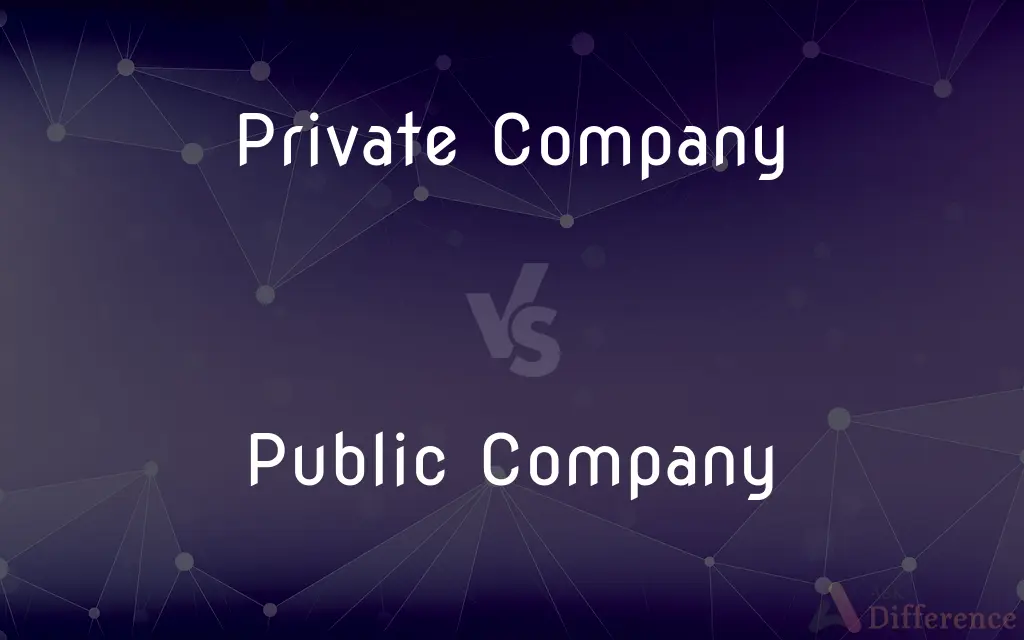Private Company vs. Public Company — What's the Difference?
By Tayyaba Rehman — Published on November 23, 2023
A Private Company is owned by private shareholders, not open to the public. A Public Company has traded shares on the stock market, open to public investment.

Difference Between Private Company and Public Company
Table of Contents
ADVERTISEMENT
Key Differences
A Private Company is an enterprise whose ownership is restricted to a certain group of individuals or institutions. These owners often include the company's founders, family, and perhaps a select group of investors. On the other hand, a Public Company is one whose shares are traded on a public stock exchange, making it open for investment by anyone who can buy its shares.
In the realm of the Private Company, the ownership details and financial statements are not always disclosed to the public. Contrastingly, a Public Company is bound by stringent regulatory requirements to disclose its financials and other significant information transparently.
While Private Companies often have the advantage of quicker decision-making processes without the scrutiny of public shareholders, Public Companies benefit from greater access to capital by issuing shares to the general public through the stock market.
One significant aspect of a Private Company is that it does not need to meet the extensive filing requirements set by regulators. Meanwhile, a Public Company is under the constant watch of regulatory bodies, ensuring adherence to regulations for the protection of public shareholders.
In terms of valuation, a Private Company's worth is often determined during funding rounds or acquisitions. In contrast, a Public Company's value can be assessed any given day based on its share price in the stock market.
ADVERTISEMENT
Comparison Chart
Ownership
Limited to select individuals/groups
Open to public via stock market
Disclosure
Often not mandated to reveal financials
Must disclose financials & other info
Regulatory Oversight
Less stringent
Highly regulated by bodies like SEC
Capital Access
Primarily through private funds
Through issuing shares in stock market
Valuation
Determined during funding or acquisitions
Determined by stock market price
Compare with Definitions
Private Company
A Private Company's shares are not available for general public purchase.
I wish I could invest in that startup, but it's a Private Company.
Public Company
A Public Company is owned by multiple shareholders from the general public.
Anyone can buy shares and become an owner of a Public Company.
Private Company
A Private Company is not publicly traded on any stock exchange.
After years of success, they decided to keep it a Private Company rather than going public.
Public Company
A Public Company has a broader access to capital through public funding.
Becoming a Public Company has allowed them to fund larger projects and expand rapidly.
Private Company
A Private Company often has a more limited scope of disclosure.
The financial details of the Private Company remain confidential.
Public Company
A Public Company has its shares traded openly on the stock market.
Many people dream of their startups becoming a successful Public Company one day.
Private Company
A Private Company is a business owned by non-governmental organizations or a small number of shareholders.
My uncle runs a Private Company that manufactures toys.
Public Company
A Public Company must disclose its financial statements and other significant data.
Quarterly earnings calls are a norm for any Public Company.
Private Company
A Private Company has fewer regulatory requirements than its public counterparts.
Operating as a Private Company gives them more flexibility in their business decisions.
Public Company
A Public Company is subject to strict regulations and oversight.
Joining the ranks of a Public Company means adhering to the SEC's regulations.
Common Curiosities
How can I invest in a Public Company?
You can buy shares of a Public Company through stock exchanges.
How is a Public Company different from a Private Company?
A Public Company has shares traded on stock markets, while a Private Company doesn't.
Are Private Companies smaller than Public Companies?
Not necessarily. Some Private Companies are substantial, but they choose to remain private.
Can I buy shares in a Private Company?
Typically, shares of a Private Company aren't available to the general public.
Why would a Private Company go public?
To raise capital, gain liquidity, or for branding purposes.
Why do Public Companies have quarterly reports?
It's a regulatory requirement to keep public investors informed.
Are Public Companies always more valuable than Private Companies?
Not always. Value depends on various factors, not just public status.
What is a Private Company?
A Private Company is a business owned by private shareholders and isn't open for public investments.
What's an IPO?
Initial Public Offering, where a Private Company goes public by selling shares to the public for the first time.
Do Public Companies disclose more information than Private Companies?
Yes, Public Companies are generally required to disclose more due to regulatory standards.
Do Private Companies have stock options?
Yes, some Private Companies offer stock options as employee incentives.
Can I start a Private Company and then take it public?
Yes, many startups begin as Private Companies and later go public through an IPO.
Can a Public Company become private again?
Yes, through a process called a "take-private" transaction.
How do Private Companies raise capital?
They often do so through private investors, venture capitalists, or loans.
Which has stricter regulatory oversight: Private or Public Company?
Public Companies typically face stricter regulations.
Share Your Discovery

Previous Comparison
E-reader vs. Tablet
Next Comparison
Economic Activities vs. Non-Economic ActivitiesAuthor Spotlight
Written by
Tayyaba RehmanTayyaba Rehman is a distinguished writer, currently serving as a primary contributor to askdifference.com. As a researcher in semantics and etymology, Tayyaba's passion for the complexity of languages and their distinctions has found a perfect home on the platform. Tayyaba delves into the intricacies of language, distinguishing between commonly confused words and phrases, thereby providing clarity for readers worldwide.
















































